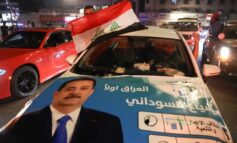BAQUBA (IPS) — U.S. backed Sunni militants have challenged the U.S.-backed Iraqi government in Baghdad, and demanded political power after two women were killed by government forces. Tensions rose earlier this month when men dressed in Iraqi security personnel uniforms kidnapped two women. Their naked bodies were found later. After the incident, the “Awakening Groups” in Baquba, 40 km northeast of Baghdad, gave Shi’a police chief Gen. Ghanim al-Qureyshi until mid-day Friday to apologize and to arrest the men responsible.

|
| Relatives mourn the death of 9-year-old Suroor Salman Hussein in Baquba, Iraq |
“We hereby declare suspension of all co-operation with U.S. military, Iraqi security forces and the local government,” Abu Abdullah, spokesman for the Awakening Council in Diyala province announced after the deadline passed. On Saturday hundreds of members of the Awakening Council shut their offices and held three separate demonstrations in Baquba. The government in Baghdad promised to send a committee to investigate the incident, following which the Awakening Council of Diyala resumed security of the city. Although the Awakening Groups have resumed security duties, they asked residents to stop going to their offices or shops for three days, Feb. 9-11. On Sunday fighters from these groups entered the office of the directorate-general of education and ordered employees to leave, Abu Harith, a fighter with the Awakening Group told IPS. “They did the same at other offices. We will keep doing so until our demands are met — the resignation of the police chief.” The Awakening Groups, also referred to as Concerned Local Citizens by the U.S. military, were formed to battle al-Qaeda. Members are paid 300 dollars a month by occupation forces, and now number over 80,000 across Iraq. The groups form a counterweight to the government security apparatus, which has long been known to comprise primarily Shi’a militiamen. Residents of Baquba are worried over the fallout, and the incident has already sparked violence. “The crisis began when two women were arrested and raped at a police checkpoint near their hometown,” resident Abu Muhaned told IPS. “As a reaction to this, people of Tahreer district (two kilometres from Baquba), which is a stronghold of the (Sunni) Islamic party, attacked some Shi’a families.” Sectarian tensions, already high between the Awakening Groups, which are 82 percent Sunni, and Shi’a government forces, escalated after the incident. “Sounds of firing were heard, and people of Baquba felt that the streets may be overrun by militants again,” Muhaned said. “The situation will get worse, and clashes may happen if the government does not behave wisely.” Adding to the crisis is the bombing of an office of one of the members of the Islamic party, Hussein al-Zubaidi, member of the Diyala province governing council who is responsible for security. Local sources told IPS that Zubaidi was injured and two U.S. soldiers were killed in the attack, but the deaths have not been confirmed by the U.S. military.

The Islamic Party accused Qureyshi of leaving Zubaidi without protection. Some members of the party told IPS there were sharp verbal exchanges later at a meeting of the governing council, leading almost to blows. The conflicts have arisen in a situation where Sunnis say most jobs in the province go to Shi’a. “Sunni ex-officers are not allowed to return to their jobs (since the occupation), while all the Shi’a have their own jobs back,” a member of the Diyala Awakening Council, speaking on condition of anonymity, told IPS. “The idea behind this procedure is that once all the officers are Shi’a, the Shi’a will control the city.” Before the recent incident involving the two women, two Sunni men were kidnapped at a police checkpoint. “They were released, but immediately after they were kidnapped near the emergency police office,” local trader Abu Ibrahim told IPS. “No one can kidnap people there unless he is from the police. These two men were later found killed in the street.” People have begun to show their resentment over the sectarian behavior of the police, and have accused the government of destablizing the city. The conflict is taking various forms. A leader of the local Awakening Council, also speaking on condition of anonymity, told IPS that members of the Awakening Groups were not being allowed into government jobs. “Qureyshi hired thousands of Shi’a in the police force, even those above the age limit (30),” he said. “This is because they are Shi’a. Now, every person aged 16-50 years in Khirnabat (Qureyshi’s home town) is a policeman.”





Leave a Reply